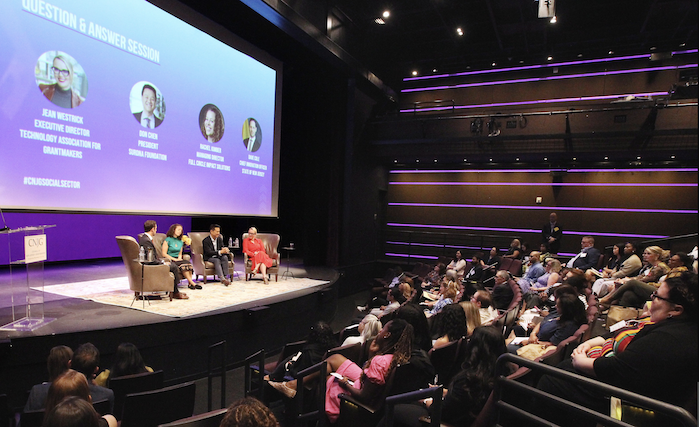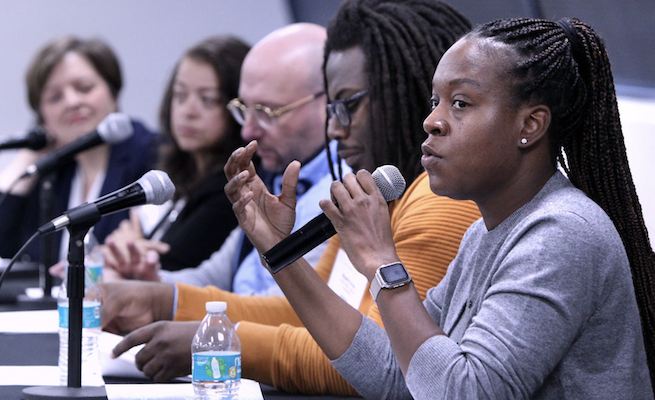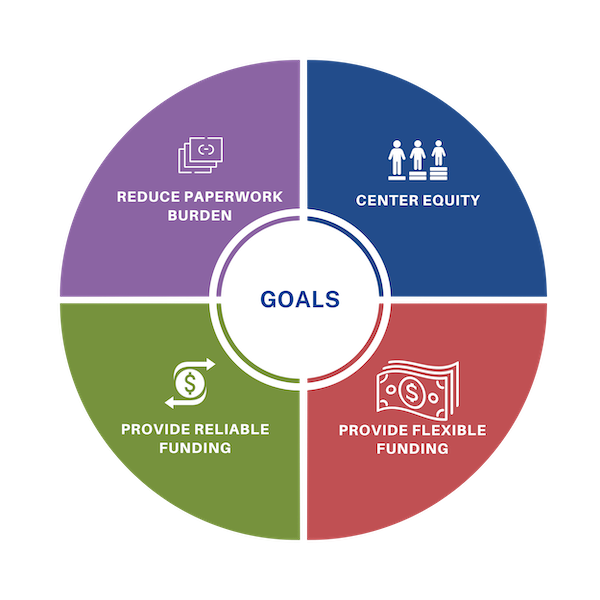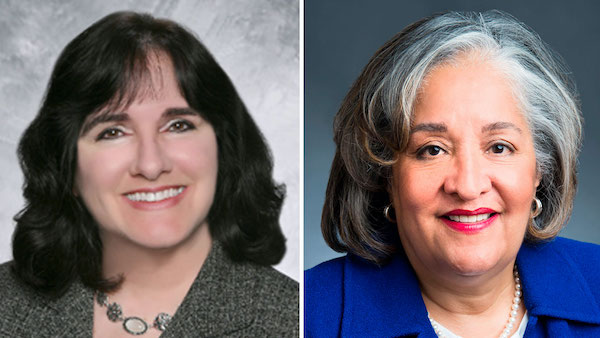Site Search
- resource provided by the Forum Network Knowledgebase.
Search Tip: Search with " " to find exact matches.
Small BIPOC organizations and/or historically excluded/led
organizations have greater access to funding.
Affirmation: We must center the most marginalized, underfunded, and impactful organizations.
BIPOC, grassroots, and/or historically excluded1 leaders are the most proximate to the populations and communities that face the most pressing social issues and should be central to designing solutions and funded; yet they are often overlooked or ignored as real change-makers.
They are underinvested in by major funders and are often left to struggle on their own; and when they are funded, grants are small and often highly restricted.
Some funders have artificially high budget requirements, require collaboration with larger “more sophisticated” organizations, won’t fund fiscally sponsored groups, or emphasize leadership requirements that are increasingly out of date or exclude vital lived experience.
Community organizations are exploring innovative and egalitarian management structures, such as co-directorships, collectives, and collaboratives, that do not resemble the constructs of the past.
Leadership comes in all structures, sizes, and identities; funders must seek to recognize and fund those who are doing effective work and re-evaluate their views of accepted leadership patterns. For BIPOC, grassroots, and/or historically excluded leaders to succeed, we must provide flexible resources and professional development support while they are leading.
Activities
Below are activities your organization can engage in that will advance your equity focus
• Agree as a community of practice to a shared definition of BIPOC, grassroots, and/or historically excluded-led organizations to foster a common frame of reference to help guide this work.
• Create networking and referral opportunities for BIPOC, grassroots, and/or historically excluded leaders to expand their access to funding and opportunities similar to that of larger, mainstream groups.
• Invest in the development and pipeline of BIPOC, grassroots, and/or historically excluded leaders.
• Remove funding barriers for small BIPOC, grassroots, and/or historically excluded organizations that have traditionally been precluded from funding because of budget size, leadership structure, auditing requirements, and similar obstacles.
• Actively partner with BIPOC, grassroots, and historically excluded organizations to make funding decisions on issues closest to their communities.
• Provide significant, multi-year, general operating funding to organizations and movements led by BIPOC, grassroots, and/or historically excluded communities.
Short-term Outcomes
• Progress is tracked into addressing the barriers to funding BIPOC, grassroots, and historically excluded-led organizations in NJ.
• A greater number of BIPOC, grassroots, and/or historically excluded-led organizations are funded than before, by new and existing funders.
• Professional development and capacity building as requested by BIPOC, grassroots, and/or historically excluded leaders is funded.
Long-term Outcomes
• BIPOC, grassroots, and/or historically excluded leaders can access funding and opportunities similar to that of larger, mainstream groups.
• A greater percentage of support to organizations and movements led by BIPOC, grassroots, and historically excluded communities is provided as significant, multi-year, general operating funding. In this context, “significant” can refer to both the quantity, size or percentage of grants awarded by the funder in any given year.
How to Begin Doing Good Better on Equity
Learning opportunities
• Which criteria and practices are creating, perpetuating or exacerbating exclusion of BIPOC, grassroots, and or historically excluded-led organizations?
• For funders that exclude or limit funding to small organizations, why are these barriers in place? What biases or missed opportunities are resulting from these obstacles?
• When funders are actively prioritizing BIPOC, grassroots, and historically excluded -led organizations in their philanthropic partnerships, what definitions, outreach, and partnership strategies are being used? How has this evolved based on lessons learned?
Pre-Work
• Funders should become educated about how traditional ways of identifying grantees and other criteria often excludes BIPOC, grassroots, and/or historically excluded-led organizations.
• Actively seek and share ways to center, identify, fund, and partner with applicants or community-based partners to create solutions in all efforts.
• Identify forums or protocols for introductions, dialogue, and relationship-building between funding community and BIPOC, grassroots and/or historically excluded-led organizations to pave the way for ongoing or stronger partnerships.
One year from now the 2020 Census will be in full swing. This nationwide, constitutionally-mandated count, conducted once every ten years, is our opportunity to ensure that New Jersey residents are accurately counted to secure the resources needed to support our communities. Nationally, more than $800 billion in federal funding as well as fair, proportional voting representation are at stake. In New Jersey, allocations from 16 federal programs including Medicaid, education grants, and even highway planning and construction are allotted based on the census count. This totaled over $17 billion in 2015.
But the 2020 Census is facing unprecedented challenges, including years of underfunding, a climate of fear, the challenges of the first “high tech” census, and the potential addition of an untested citizenship question. That means we will all have to work together to overcome these challenges and help achieve a fair and accurate census to ensure that the hardest-to-count communities—like people of color, low-income folks, LGBTQ people, immigrant communities, rural communities, and young children—aren’t missed. Based on the latest census estimates, approximately 22% of New Jersey’s population lives in hard-to-count areas.
CNJG joins the Funders’ Committee for Civic Participation’s Funders Census Initiative, United Philanthropy Forum and philanthropy-serving organizations around the country in asking our members to commit to supporting and encouraging a fair and accurate census.
The Census is one of our nation’s most important and consequential civic obligations. Getting it right and counting everyone ensures people and communities can thrive.
Please feel free to reach out to me or Deputy Director Theresa Jacks for information about the Council’s work on behalf of a full, fair and accurate 2020 Census.
Sincerely,
Maria Vizcarrondo, President and CEO
Council of New Jersey Grantmakers
From the Commonfund, these white papers on investment policy statements, spending policy, board governance and risk tolerance, together with their most recent studies of investments at private and community foundations, operating charities and nonprofit healthcare organizations are made available though CNJG's Investment Forum for Foundations and Endowments.
In 2003, with member support, CNJG commissioned a report on the impact a potential conversion of Horizon Blue Cross Blue Shield to a for-profit might have on access to health care in New Jersey. Research from the Center for State Health Policy (CSHP) at Rutgers University, provided details about the law governing such conversions in New Jersey and the experience of other states with conversions. The report identified questions raised in other states when such conversions occur, especially about the valuation of assets, the impact on low-income families, and the operation of the philanthropic foundations that have been established as stewards of the assets generated by the conversions. CNJG’s purpose was to seek answers to critical questions relevant to the availability of healthcare coverage for New Jersey’s citizens and to discuss models of best practice for healthcare conversion foundations across the United States.
Excellence in Giving
In 2005, CNJG adopted Guiding Beliefs & Principles to offer a thoughtful source of direction and inspiration to help guide our state’s philanthropic sector into the future. CNJG first launched its Excellence in Giving initiative in 2007 with the goal is to provide grantmakers the practical tools necessary to ensure best practice in their operations and grantmaking.
The first booklet, Guiding Beliefs & Principles for New Jersey Grantmakers includes a wealth of insights and tips related to board governance, legal compliance, grantee communications, fiscal responsibility, public disclosure, and many other key areas of foundation governance and operations. It contains wisdom provided by leaders of all types of giving organizations within the CNJG’s membership, and is intended to serve as a practical resource to assist New Jersey foundations in their grantmaking. CNJG’s board is in the process of updating these beliefs and principles in 2023/2024. For more information on the updating process, please contact Theresa Jacks.
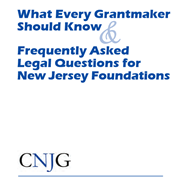 In 2010 CNJG released a second, comprehensive resource to help the state’s philanthropic community understand their ethical, legal, and fiduciary requirements and obligations - What Every Grantmaker Should Know and Frequently Asked Legal Questions. These two booklets are key publications in CNJG’s Excellence In Giving Series. While the Guiding Beliefs & Principles is available publically, members will need to log into access the legal guide for download.
In 2010 CNJG released a second, comprehensive resource to help the state’s philanthropic community understand their ethical, legal, and fiduciary requirements and obligations - What Every Grantmaker Should Know and Frequently Asked Legal Questions. These two booklets are key publications in CNJG’s Excellence In Giving Series. While the Guiding Beliefs & Principles is available publically, members will need to log into access the legal guide for download.
Members can request additional copies of the booklets mentioned on this page by contacting Theresa Jacks.
Empowering the Future: Harnessing AI and Data for Philanthropic Social Impact
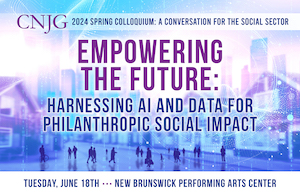
Date: Tuesday, June 18
Time: 9:30 a.m. to 3:30 p.m.
Location
New Brunswick Performing Arts Center
Arthur Laurents Theater
11 Livingston Ave, New Brunswick, NJ 08901
Directions and Parking
On Tuesday, June 18, 2024, the Council of New Jersey Grantmakers held the Spring Colloquium – A Conversation on the Social Sector at the New Brunswick Performing Arts center. This year, we explored the impact of AI and data on philanthropy and the nonprofit sector. Our panel discussion will brought together multiple perspectives to explore how AI can enhance problem-solving without losing human connections, how it affects equity, and how philanthropy has engaged with AI for funding initiatives.
The Technology Association of Grantmakers’ new Executive Director, Jean Westrick, moderated our esteemed panel that included Don Chen, President, Surdna Foundation; Rachel Kimber, Full Circle Solutions; and Dave Cole, State pf New Jersey’s Chief Innovation Officer.
After the panel, Jean Westrick, TAG, facilitated an afternoon session on an AI Framework for Philanthropy. Additionally, the Community Resource Exchange presented an afternoon session on an AI Guide for Nonprofits facilitated by their CEO, Tiloma Jayasinghe, CEO and Jared Carroll, Senior Consultant.
CNJG’s spring colloquium brought together New Jersey grantmakers and nonprofits to connect with each other, Increase their knowledge, learn best practices, find opportunities for collaboration, and to be introduced to new ideas.
Conference Photos
Inspiring Change through Leadership: Maximizing Philanthropic Impact
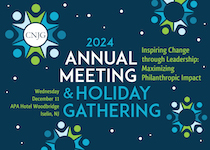 Wednesday, December 11, 2024 - 9:00am to 3:00pm
Wednesday, December 11, 2024 - 9:00am to 3:00pm
Luncheon, Keynote Presentation & Workshop
Location: APA Hotel Woodbridge, 120 Wood Ave S, Iselin, NJ 08830
The Council of New Jersey Grantmakers thanks everyone who attended our 2024 Annual Meeting & Holiday Gathering. On Wednesday, December 11, over 130 Council members and special guests gathered to celebrate the holiday season, welcome new CNJG members, convene our annual business meeting, and feature a dynamic discussion related to the vital work of philanthropy.
The Council’s 2024 Annual Meeting & Holiday Gathering was the place where CNJG members and New Jersey’s philanthropic community came together to share ideas about the important work they’re doing. It also provided a valuable opportunity to connect with colleagues.
This year’s theme, Inspiring Change through Leadership: Maximizing Philanthropic Impact, featured keynote speaker Amalia Brindis Delgado of the Panta Rhea Foundation.
The Annual Meeting included a workshop that explored the New Jersey Principles for Philanthropy. An overview of the Principles was presented, followed by a panel of fellow CNJG members who discussed how they are already using the Principles within their organizations. Attendees also had time to discuss how they could leverage the New Jersey Principles for Philanthropy to make changes within their own organizations.
Annual Meeting Photos

Deepening Philanthropic and Nonprofit Partnerships in New Jersey
Doing Good Better, a partnership of the Council for New Jersey Grantmakers and the New Jersey Center for Nonprofits, is a community of funders and nonprofits taking action against the power imbalances and racial inequities in philanthropy, nonprofits and government. Accessible, equitable, and mutually accountable relationships are primary and indisputable building blocks for a stronger society and thriving communities. Our goal is to shift the culture of the New Jersey philanthropic and nonprofit ecosystem by encouraging funders, nonprofits, and government to create shared power rooted in collaboration, mutual trust, and respect.
Doing Good Better Goals: A Framework for Change
The Doing Good Better Steering Committee encourages funders to focus on and advocate for four changes that can make an immediate difference in addressing power dynamics between nonprofits and funders and maximizing nonprofit impact.
Why now?
For many years, but particularly in the context of the COVID-19 pandemic, natural disasters, and the heightened outcry for racial equity and social justice, funders have been urged to embrace more flexibility and transparency in their grantmaking. Practices such as general operating support, simplified application and reporting procedures, multi-year funding and others have been shown to level the power imbalance, advance greater equity, strengthen partnerships between funders and their nonprofit partners, and thereby improve community impact.
Many grantmakers temporarily embraced flexible practices in the wake of Superstorm Sandy and during the height of the pandemic, and these structural changes empowered nonprofits to become more resilient and have a greater impact in their communities. But while some funders have retained the flexible practices, others have reinstated previous restrictions.
In New Jersey and across the country, there is a renewed urgency to NOT return to business as usual. It’s long past time.
Doing Good Better invites all of us to reflect on how power is distributed in our partnerships, learn from our peers, and make adjustments that position all community partners for transformative, equitable change in New Jersey.
How?
Guided and informed by 50+ advisors from New Jersey who represent a broad range of perspectives from nonprofits, philanthropy, and beyond, we are approaching this work through the lens of systems change – the recognition that transformative change can only occur after power structures have been addressed collectively. Specifically, Doing Good Better encourages funders to consider the power dynamics that underpin their policies, practices, and resource flows. To do this, we provide resources and a space for dialogue centered on changes in key practices and culture shifts.
Quick practice changes you can make now.
The road to systems change begins with changing practices that impede nonprofits’ pursuit of their missions, and implement practices that demonstrate respect for and trust in the expertise and experience of nonprofits and the communities they serve. Several key practices have consistently been shown to be particularly effective. Many of these have been requested by nonprofits for quite some time, and are reflected in the principles of Trust-Based Philanthropy and Community-Centric Fundraising, among others. Here are a few practice changes you can make now:
Type of Funding
● Give multiyear and unrestricted funding, especially for grantee partners with which you’ve had long term relationships.
Access to Funding
● Create alternative processes for organizations too small to submit audits to reduce barriers to obtaining grants.
● Set aside funding pools for BIPOC-led organizations that may not have access to traditional funding sources.
Simplifying the Process
● Simplify and streamline application and reporting processes.
● Eliminate annual requests for organizational information that does not change from year to year.
Learning
● Engage with the community through participatory grantmaking that aligns with the community’s goals.
● Open dialogues with nonprofits by soliciting and acting on feedback
How do we know?
We’ve asked the experts: nonprofits, foundations, and community members who are working directly in our community as well as peers from across the country who are eliminating power imbalances in their own communities.
● Feedback from over 50+ Advisors
● The Council of New Jersey Grantmakers survey
● The Center for New Jersey Nonprofit’s survey
● The Trust Based Philanthropy Project
● The Community-Centric Fundraising movement
● Thought leaders and advocates throughout the nonprofit community
● Case studies from across the US
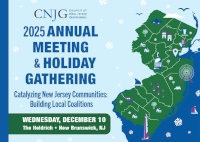 Catalyzing New Jersey Communities: Building Local Coalitions
Catalyzing New Jersey Communities: Building Local Coalitions
Wednesday, December 10, 2025 - 10:00 am to 3:00 pm
Location: The Heldrich Hotel & Conference Center
10 Livingston Avenue, New Brunswick, NJ 08901
Join over 125 of your fellow CJNG members and special guests for a day to celebrate the end of the calendar year, connect with colleagues, and explore this year's theme: Catalyzing New Jersey Communities: Building Local Coalitions. We will celebrate our collective impact, share stories of success, learn from one another’s experiences, and collectively envision a more connected, resilient, and equitable future for New Jersey. The Annual Meeting & Holiday Gathering includes a panel discussion that will explore the profound and tangible ways that philanthropy can move beyond traditional grantmaking to become powerful coalition builders for lasting change.
During the luncheon, we will convene our annual business meeting to elect new trustees, recognize new CNJG members, and report on our activities for the year. There will be time to connect and collaborate with colleagues and friends, old and new.
The day kicks off with a New Member Orientation for any new CNJG members or new staff of existing members to learn more about CNJG’s many offerings. Separate registration is required.
Prior to the Annual Meeting, CNJG will offer a deeper dive into the Impala platform that will launch in New Jersey for all grantmakers and all nonprofits. During this workshop, we will showcase the Impala for Grantmakers product which can help you:
- Conduct due diligence for potential and returning grantees
- Find nonprofits that you might not yet know
- Find who else is funding in a particular geographic or topical area
- Find which nonprofits are working in a particular geographic or topical area
- Find connections to other funders
- Communicate to potential applicants what your funding criteria is
| Agenda | |
| 9:00 am – 12:00 noon | Registration, Networking, Continental Breakfast and Coffee |
| 10:00 am – 11:30 am | Workshop |
| 12:00 noon – 12:45 pm | CNJG Annual Meeting of Members |
| 12:45 pm – 1:30 pm | Lunch and Networking |
| 1:30 pm - 2:20 pm | Panel followed by Q & A |
| 2:20 pm – 2:35 pm | Meeting adjourns |
| 2:35 pm – 3:00 pm | Networking |
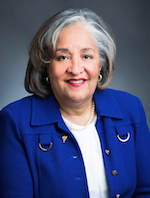 New Jersey’s largest philanthropic association has named longtime social sector leader Maria Vizcarrondo as its president.
New Jersey’s largest philanthropic association has named longtime social sector leader Maria Vizcarrondo as its president.
“Maria has been a trailblazer throughout her career,” said Council of New Jersey Grantmakers Board Chair William V. Engel. “We turn to her to help the state’s diverse and dedicated philanthropies to be even more effective in their quest to make this a better place.”
The Council of New Jersey Grantmakers is a nonprofit organization of over 130 members representing the philanthropic community in the state. Members include family, private, community, independent and corporate foundations, and corporate giving programs.
The Council exists to strengthen and promote effective philanthropy throughout New Jersey. CNJG’s programs and resources increase the impact of organized philanthropy’s support for adequate health care, quality education, a cleaner environment, community development, historical preservation, disaster response and relief, research, recreation, culture, and other areas crucial to the fabric of New Jersey's communities.
“I am very excited about joining the Council of New Jersey Grantmakers as its CEO and working with dynamic individuals — many of whom I have known and respected throughout my nonprofit career,” Ms. Vizcarrondo said. “Most importantly, I look forward to forging partnerships that will advance the Council’s social impact as a sector leader in New Jersey communities, the region, and nation.”
Ms. Vizcarrondo, who spent most of her career in northern New Jersey, comes to the Council from Cabrini University in Philadelphia, where she most recently was Director of Community Development and External Relations. She was inaugural Executive Director of the school’s Nerney Leadership Institute, launched in 2013.
Ms. Vizcarrondo brings more than 25 years of experience transforming service organizations and has served her communities as both an appointed and elected official.
In 2006, when he was first elected Mayor of Newark Cory Booker tapped Ms. Vizcarrondo to head Newark’s Health and Human Service Department, the largest of its kind in New Jersey. One of her first actions in that role was to develop a Children’s Bill of Rights to benchmark improvements in the lives of children and families throughout the city. Her accomplishments included securing state funding to establish Family Success Centers to provide neighborhood- based services, and launching a major citywide campaign to raise the immunization rates of Newark’s children.
Prior to her mayoral appointment, Ms. Vizcarrondo served as the first woman president and CEO of United Way of Essex and West Hudson. Her pioneer work in re-engineering the organization’s mission into community building was documented in the United Way Transformation Diaries. In the aftermath of the 9/11 attacks, Ms. Vizcarrondo led the New Jersey United Ways in a statewide coordination of services for affected families and managed the distribution of corporate funding for these efforts.
She was elected Essex County Surrogate in 1993 and served four years of a five-year term before leaving to join United Way.
Ms. Vizcarrondo has been listed among the “100 Most Influential People in New Jersey” and was a founding member of the New Jersey Institute for Social Justice.
###
This PowerPoint presentation developed by Southeastern Council of Foundations provides an excellent overview to the pros and cons of different philanthropic structures for Corporate entities, including Corporate Foundations, Corporate Giving Programs, and working through Community Foundations.
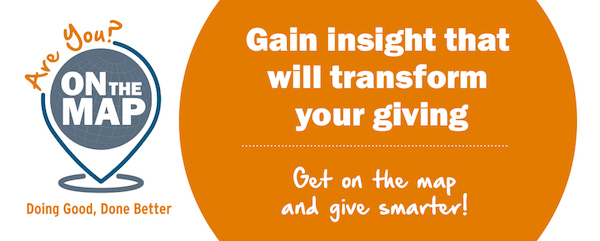
Get on the map and give smarter
Get on the Map is an exciting data-sharing initiative designed to dramatically improve the quality and availability of giving data for our region. Using this tool to put your grantmaking in context will provide valuable insights that can transform your giving.
Knowing how other foundations or corporations are funding in a certain geographic area or with a specific nonprofit can make everyone’s work more effective.
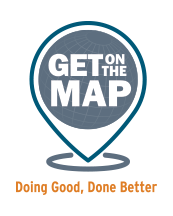 Imagine real-time answers to questions like:
Imagine real-time answers to questions like:
- How are others serving at-risk youth?
- Are organizations in our region receiving enough capacity building support?
- Who else funds economic development in our rural communities?
Through a partnership with Candid (formerly the Foundation Center) and the United Philanthropy Forum, Get on the Map enables CNJG members to see the scope of their grantmaking, find natural funding partners, and gain deeper understanding of New Jersey’s philanthropic landscape.
Watch the short video below to learn how easy it is to Get on the Map!
It starts with sharing your giving data
Your data will power valuable resources for your organization and our region, including access to the CNJG Foundation Funding Map, a special interactive searchable mapping platform, engineered by Candid.
When you share your data, you control your story. No one knows your grantmaking better than you. Tell your story, your way is good for the sector because better information benefits everyone. Join the community of funders sharing their data to ensure the field is acting on the best possible information. Share Now!
Self-Paced Training for Funders on Using Candid
Candid has also launched a new, free self-paced course for funders: Funding Smarter: Using Candid Tools to Inform and Share Your Foundation’s Work. The course is meant to help funders use Candid’s mapping, data, and knowledge tools to better identify funding peers, potential grantee partners, identify funding connections and gaps, and learn from knowledge other funders have already shared. It also highlights the value of sharing data with Candid.
Joint Statement from CNJG and the Center for Non-Profits
This statement also appeared on NJ Spotlight.
A conversation between two customers in line at a New Jersey supermarket turned ugly when one man denigrated the other with a racial slur and blamed the fellow shopper for the coronavirus pandemic.
With so much else going on these days, it would be so easy to react to such a seemingly minor incident by saying, oh well, these things happen. Times are tough; tempers are short.
But shrugging our shoulders is not an option. Doing so is complicity in a wrongful acts that too often are repeated, over and over. Our silence merely emboldens those who would tear apart the fabric of our society, whether through hate or ignorance – or the extremely volatile mix of the two.
It’s not difficult to connect the dots between “little” incidents and the systemic racism that leads to tragedies like the killing of George Floyd in Minneapolis. When we ignore or accept any examples of people being demeaned over what they look like or where they (or their ancestors) came from, we only open the door for massive abuses and the wrenching reckoning that follows them.
We mustn’t be cowed by fear of being seen as overly sensitive or labeled “politically correct.” This is about being morally and ethically correct in the face of bias and hatred – and that shouldn’t be too much to ask of Americans, regardless of their political party or ideology.
As state Attorney General Gurbir Grewal said recently, “COVID-19 is no excuse for racism, xenophobia, or hate. Discrimination and harassment in violation of New Jersey law remains illegal even if it occurs against the backdrop of a global pandemic." It’s gratifying to live in a state where the top law enforcement officer speaks out this way.
Unfortunately, it also is a state where reported hate crimes are up in recent years. We can’t tolerate such behavior, whether by police, elected officials or “average people.” There is too much at stake for bias to become the new normal.
As the leaders of the major philanthropic and non-profit membership organizations in New Jersey, representing both the wide range of non-profit groups and the multi-faceted funders of those groups, we feel compelled to speak out against the hateful responses we and our members have witnessed in reaction to the COVID-19 Pandemic.
Our country has seen countless examples of selfless sacrifice and good works over the past weeks, both on individual and institutional levels. We are proud that the members our organizations have been leaders in responding to the needs of our community.
But to our distress, some individuals are using the pandemic to put forward their bias and hatred toward their fellow citizens.
Times of crisis bring to the surface, on the part of some people, the need to scapegoat. Often, this takes the form of lashing out at particular groups, stirred up by inflamed rhetoric or more subtle code words or phrases, having no relationship to facts. In this time, there have been verbal and physical attacks against people of Asian and Pacific Islander background, as there were against Muslims after September 11 and against African-Americans and Latinos in countless other instances. This hatred and these attacks must stop.
The non-profit sector is the backbone of our communities, providing assistance and education to a wide range of people, in good times and especially in challenging times. Many of these services are a lifeline to people of all backgrounds, religions, ethnicities and statuses in life.
Non-profit organizations are the vehicle through which people can work together to selflessly assist others. People around the world view the United States as being unique in the breadth and depth of its charitable and philanthropic work, engaging the talents of all individuals, regardless of their economic or social status.
We call upon all people of good conscience in their good work to be alert for hateful words and actions and – always -- to speak out against them, both as individuals and as organizations.
Our language and our actions do matter.
Everyone, and especially people in positions of public trust or prominence, has the obligation to use our works and our lives to assist all in need and to honor the dignity and potential of all those we meet.
We call on not only our own members, but everyone who serves and volunteers in our sector to join us in this effort to speak out against racism and hatred and to exemplify all the best that we know our country is.
Maria Vizcarrondo
CNJG CEO and President
Linda Czipo
Center for Non-Profits CEO and President
William V. Engel
CNJG Board Chair
Gina M. Plotino
Center for Non-Profits Board Chair
The Newark Philanthropic Liaison is a unique partnership between the Council of New Jersey Grantmakers and the City of Newark, supported by several foundations. Read more about the Liaison’s work In these reports. Due to several transitions, there were no written reports between 2015 and 2022.
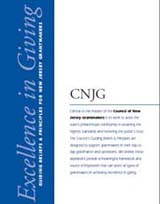
This includes insights and tips related to board governance, legal compliance, grantee communications, fiscal responsibility, public disclosure, and many other key areas of foundation governance and operations. It is intended to serve as a practical resource to assist foundations in their grantmaking.




